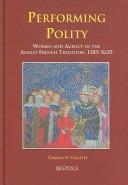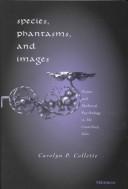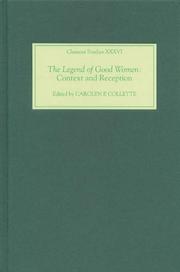| Listing 1 - 10 of 11 | << page >> |
Sort by
|

ISBN: 2503518001 9782503518008 Year: 2006 Volume: 15 Publisher: Turnhout Brepols
Abstract | Keywords | Export | Availability | Bookmark
 Loading...
Loading...Choose an application
- Reference Manager
- EndNote
- RefWorks (Direct export to RefWorks)
Reading a variety of texts centred in the power and agency of women during the period 1385 to 1620, this book examines changing ideals of gender within the context of changing ideologies of governance and polity. Together the essays that comprise this book lay out three lines of thinking about women and polity: that the ideology of late medieval gender roles articulated in Anglo-French texts of the late fourteenth and early fifteenth centuries outlined important roles for women’s voice and agency in supporting the larger polity as well as the smaller household; that the acceptance and the value of those roles diminished as models of polity in both Church and State in England changed in the early modern period; that to see this change merely in terms of change in expectations of gender roles is to miss the vital link between the status of women and the political construction of individual relationship to authority. Woman is the site on which society delineates the degree of freedom and independence it will tolerate in the political subject. The attention directed to women’s roles in the plethora of woman-centred stories, courtesy books, prayer books, sermons and tracts in the period 1385-1620 is an index to shifting alignments of power that replaced medieval models of partnership and co-operation with models of obedience.
Sociology of literature --- Fiction --- Thematology --- Old English literature --- Old French literature --- Femmes --- Geschiedenis van de Middeleeuwen --- Geschiedenis van de nieuwste tijden --- Histoire contemporaine --- Histoire du Moyen Age --- Vrouwen --- English literature --- French literature --- Sex role --- Women and literature --- Women --- History and criticism. --- History. --- History --- Social conditions. --- History and criticism --- Social conditions --- FEMMES DANS LA LITTERATUREè --- LITTERATURE ANGLAISE --- LITTERATURE FRANCAISE --- 1100-1500 (MOYEN-ANGLAIS) --- HISTOIRE ET CRITIQUE --- AVANT 1500 --- 1500-1700

ISBN: 0472111612 9780472111619 Year: 2000 Publisher: Ann Arbor : University of Michigan Press,
Abstract | Keywords | Export | Availability | Bookmark
 Loading...
Loading...Choose an application
- Reference Manager
- EndNote
- RefWorks (Direct export to RefWorks)
Christian pilgrims and pilgrimages in literature --- Tales, Medieval --- Visual perception in literature --- Psychology in literature --- Vision in literature --- Pèlerins et pèlerinages chrétiens dans la littérature --- Contes médiévaux --- Perception visuelle dans la littérature --- Psychologie dans la littérature --- Vision dans la littérature --- History and criticism --- Histoire et critique --- Chaucer, Geoffrey, --- Tales, Medieval - History and criticism
Book
ISBN: 047202955X 9780472029556 9780472119035 0472119036 Year: 2013 Publisher: Ann Arbor
Abstract | Keywords | Export | Availability | Bookmark
 Loading...
Loading...Choose an application
- Reference Manager
- EndNote
- RefWorks (Direct export to RefWorks)
"One of the most memorable images of the British women's suffrage movement occurred on June 4, Derby Day, 1913. As the field of horses approached a turning at Epsom, militant suffragette Emily Wilding Davison ducked out from under the railing and ran onto the track, reaching for the bridle of the King's horse, and was killed in the collision. While her death transformed her into a heroine, it all but erased her identity. To identify what impelled Davison to suffer multiple imprisonments, to experience the torture of force-feedings and the insults of hostile members of the crowds who came to hear her speak, Carolyn P. Collette explores a largely ignored source--the writing to which Davison dedicated so much time and effort during the years from 1908 to 1913. Davison's writing is an implicit apologia for why she lived the life of a militant suffragette and where she continually revisits and restates the principles that guided her: that woman suffrage was necessary to improve the lives of men, women, and children; that the freedom and justice women sought was sanctioned by God and unjustly withheld by humans whose opposition constituted a tyranny that had to be opposed; and that the evolution of human progress demanded that women become fully equal citizens of their nation in every respect-- politically, economically, and culturally. In the Thick of the Fight makes available for the first time the archive of published and unpublished writings of Emily Wilding Davison. Collette reorients both scholarly and public attention away from a single, defining event to the complexity of Davison's contributions to modern feminist discourse, giving the reader a sense of the vibrancy and diversity of Davison's suffrage writings"--
Suffragists --- Women --- Suffrage --- History. --- Davison, Emily Wilding,
Digital
ISBN: 9781782042471 Year: 2014 Publisher: Suffolk Boydell & Brewer
Abstract | Keywords | Export | Availability | Bookmark
 Loading...
Loading...Choose an application
- Reference Manager
- EndNote
- RefWorks (Direct export to RefWorks)
Thematology --- Literature --- Chaucer, Geoffrey --- England

ISBN: 1843840715 9781843840718 Year: 2006 Publisher: Woodbridge Rochester : D. S. Brewer,
Abstract | Keywords | Export | Availability | Bookmark
 Loading...
Loading...Choose an application
- Reference Manager
- EndNote
- RefWorks (Direct export to RefWorks)
The essays in this volume explore the context and reception of Chaucer's neglected "The Legend of Good Women" from a variety of late medieval cultural perspectives, verbal, political, and social, expanding our understanding of the web of poetic and cultural conventions in which the Legend/I was created and received. Topics addressed include the manuscript and print history of the poem (explored through performance theory, and in the context of erotic courtly games played by the aristocracy); the politics of Philippa of Lancaster's role in transmitting the flower and leaf topos from French literature into English; the connections between love and polity in the Prologue; the influence of stories of Amazons, Thebes, and Troy; and the ludic dimensions of the Legend. Carolyn P. Collette is Professor of English Language and Literature at Mount Holyoke College. Contributors include: William A. Quinn, Joyce Coleman, Robert R. Edwards, Nancy Bradley Warren, Betsy Mccormick, Simon Meecham-Jones, Jamie C. Fumo, Nicola F. Mcdonald.
Book
ISBN: 1782042474 1903153492 Year: 2014 Publisher: Suffolk : Boydell & Brewer,
Abstract | Keywords | Export | Availability | Bookmark
 Loading...
Loading...Choose an application
- Reference Manager
- EndNote
- RefWorks (Direct export to RefWorks)
Professor Collette's approach to this challenging and provocative poem reflects her wide scholarly interests, her expertise in the area of representations of women in late medieval European society, and her conviction that the I>Legend of Good Women can be better understood when positioned within several of the era's intellectual concerns and historical contexts. The book will enrich the ongoing conversation among Chaucerians as to the significance of the Legend, both as an individual cultural production and an important constituent of Chaucer's poetic.achievement. A praiseworthy and useful monograph. Professor Robert Hanning, Columbia University. The Legend of Good Women has perhaps not always had the appreciation or attention it deserves. Here, it is read as one of Chaucer's major texts, a thematically and artistically sophisticated work whose veneer of transparency and narrow focus masks a vital inquiry into basic questions of value, moderation, and sincerity in late medieval culture. The volume places Chaucer within several literary contexts developed in separate chapters: early humanist bibliophilia, translation and the development of the vernacular; late medieval compendia of exemplary narratives centred in women's choices written by Boccaccio, Machaut, Gower and Christine de Pizan; and the pervasive late fourteenth-century cultural influence of Aristotelian ideas of the mean, moderation, and value, focusing on Oresme's translations of the Ethics into French. It concludes with two chapters on the context of Chaucer's continual reconsideration of issues of exchange, moderation and fidelity apparent in thematic, figurative and semantic connections that link the Legend both to Troilus and Criseyde and to the women of The Canterbury Tales.BR> Carolyn Collette is Emeritus Professor of English Language and Literature at Mount Holyoke College and a Research Associate at the Centre for Medieval Studies at the University of York.
Women and literature --- Mythology, Classical, in literature. --- Women in literature. --- Woman (Christian theology) in literature --- Women in drama --- Women in poetry --- History --- Chaucer, Geoffrey, --- Aristotle. --- Chaucer. --- Exemplary Narratives. --- Legend of Good Women. --- Medieval European Society. --- Troilus and Criseyde.
Book
ISBN: 9781782042471 9781903153499 Year: 2014 Publisher: Suffolk Boydell & Brewer
Abstract | Keywords | Export | Availability | Bookmark
 Loading...
Loading...Choose an application
- Reference Manager
- EndNote
- RefWorks (Direct export to RefWorks)
Book
ISBN: 9780230551367 Year: 2011 Publisher: Houndmills, Basingstoke, Hampshire ; New York : Palgrave Macmillan,
Abstract | Keywords | Export | Availability | Bookmark
 Loading...
Loading...Choose an application
- Reference Manager
- EndNote
- RefWorks (Direct export to RefWorks)
"More than a hundred primary documents offer students of later medieval English literature, society, and history intriguing original perspectives through which to understand the literary texts of the period 1350-1500 as well as the culture which created and received them. Complete with a substantial introduction, annotations and a timeline"--
Middle Ages --- Moyen Age --- Sources --- Great Britain --- England --- Grande-Bretagne --- Angleterre --- History --- Sources. --- Civilization --- Sources. --- Histoire --- Sources --- Civilisation --- Sources
Book
ISBN: 9781843844594 1843844591 9781787440135 1787440133 Year: 2017 Publisher: Woodbridge, Suffolk, UK ; Rochester, NY : D.S. Brewer,
Abstract | Keywords | Export | Availability | Bookmark
 Loading...
Loading...Choose an application
- Reference Manager
- EndNote
- RefWorks (Direct export to RefWorks)
Professor Jocelyn Wogan-Browne's scholarship on the French of England - a term she indeed coined for the mix of linguistic, cultural, and political elements unique to the pluri-lingual situation of medieval England - is of immense importance to the field. The essays in this volume extend, honour and complement her path-breaking work. They consider exchanges between England and other parts of Britain, analysing how communication was effected where languages differed, and probe cross-Channel relations from a new perspective. They also examine the play of features within single manuscripts, and with manuscripts in conversation with each other. And they discuss the continuing reach of the French of England beyond the Middle Ages: in particular, how it became newly relevant to discussions of language and nationalism in later centuries. Whether looking at primary sources such as letters and official documents, or at creative literature, both religious and secular, the contributions here offer fruitful and exciting approaches to understanding what the French of England can tell us about medieval Britain and the European world beyond. Thelma Fenster is Professor Emerita of French and Medieval Studies, Fordham University; Carolyn Collette is Professor of English Language and Literature at Mount Holyoke College. Contributors: Christopher Baswell, Emma Campbell, Paul Cohen, Carolyn Collette, Thelma Fenster, Robert Hanning, Richard Ingham, Maryanne Kowaleski, Serge Lusignan, Thomas O'Donnell, W. Mark Ormrod, Monika Otter, Felicity Riddy, Delbert Russell, Fiona Somerset, + Robert M. Stein, Andrew Taylor, Nicholas Watson, R.F. Yeager
French language --- English language --- Anglo-Norman dialect --- Anglo-Norman literature --- Language and culture --- Social aspects --- History --- French influences. --- History and criticism. --- Culture --- Germanic languages --- Langue d'oïl --- Romance languages --- British literature --- French literature --- Anglo-French dialect --- Anglo-Norman French dialect --- Law French --- Norman-French dialect --- British History. --- English. --- European History. --- French. --- Jewish studies. --- Language. --- Latin. --- Linguistics. --- Medieval Literature. --- Medieval Politics. --- Medieval Religion. --- Medieval history. --- Medieval language. --- Medieval manuscripts. --- Middle Ages. --- Primary sources.
Multi
ISBN: 9781787440135 9781843844594 1843844591 Year: 2017 Publisher: Woodbridge D.S. Brewer
Abstract | Keywords | Export | Availability | Bookmark
 Loading...
Loading...Choose an application
- Reference Manager
- EndNote
- RefWorks (Direct export to RefWorks)
Sociolinguistics --- English language --- French language --- English literature --- England
| Listing 1 - 10 of 11 | << page >> |
Sort by
|

 Search
Search Feedback
Feedback About UniCat
About UniCat  Help
Help News
News